From the Director
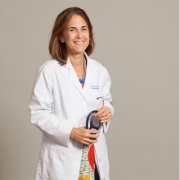
It’s almost DOCTOBERFEST! Despite the horrifically rainy weather, fall is here and we just had the historic “supermoon” lunar eclipse. So, what about my favorite season of the year …. This will be our 4th Annual Doctoberfest, where we take a little extra time to celebrate each other and get involved in our community. Look for the DOCTOBERFEST calendar at the end of Med Res News, and be on the watch for some treats, trivia, ways to take a minute and recognize an awesome colleague and to give back to the Durham Community and the world. During this month, we will also kick off the annual Duke IM fleece order (thanks Marc Samsky and Jenny Van Kirk for spearheading this) and kick off the 2015-16 recruitment season with the first party at the new Zaas house. Rumor has it that our caterer just won Food Truck Wars!
Kudos this week to our departing Duke ACR Rajiv Agarwal (don’t worry, he will be back for his month two tour later this year) and welcome to new Duke ACR Ashley Bock. Other kudos to Ryan Orgel from the CCU team for masterful leadership in some difficult situations, to Jenny Van Kirk, Rachel Hu, Julia Cupp, Landon Brown and Betty Jiang for outstanding attitudes and to everyone who attended the amazing Medicine Research Conference on Friday by our very own former Duke resident and VA Chief, and Stead faculty Susanna Naggie. Really fantastic attendance by the residency program for a great talk. I know a lot of you are out there doing really good things … please continue to send me notes about your colleagues! Also had a VERY fun dinner with JARs last week – Sam Lindner, Kavisha Singh, Katrina Abril, Jenny Van Kirk and Adam Barnett. We will get the October date on the books ASAP.
What else is happening in the Med Res world? Check out your colleagues Ashley Spann and Zach Il’Giovine on the front page of the website. Lookin’ good! And don’t forget to fill out your profile if you haven’t already done so.
Do you suffer from W5803.XA? Any chance you have Z18.01, or even worse, T63.811A? I am hoping none of you need time off for E61.5 because we can’t pull someone for that. What am I talking about? It’s ICD-10! While we can snark and giggle at the many many codes out there, ICD-10, at it’s heart, is there to make us more specific in our documentation. Documentation is a reflection of your thought process, so please use this opportunity to make your thought process clearer and reflect it in your notes. Yes, billing is better if we are more specific, but truthfully, our patient care and our learning is better if we can be more precise in how we define a patient’s medical conditions. Training modules are available and need to be completed- check your email for details.
This week’s pubmed from the program goes to our very own APD Dr. Bill Hargett for his recent article with Nephrology PD Rudy Lehrich and former Duke resident now Nephrology attending John Roberts! Exploring student preferences with a Q-sort: the development of an individualized renal physiology curriculum. Roberts JK, Hargett CW, Nagler A, Jakoi E, Lehrich RW.
Adv Physiol Educ. 2015 Sep;39(3):149-57. doi: 10.1152/advan.00028.2015
Welcome to the Duke family Margaret Layden Tucker, born to proud parents Jesse and Jenny Tucker. All smiles from Dad!
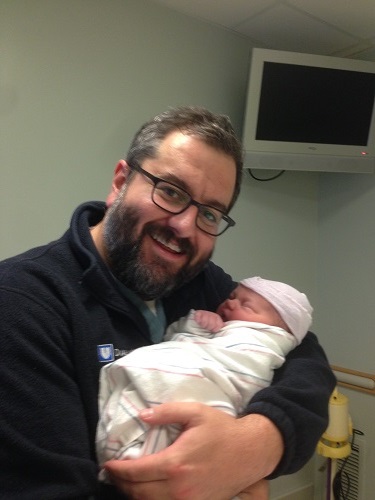
Have a great, PSL filled week, and HAPPY DOCTOBERFEST!
Aimee
What did I read this week?
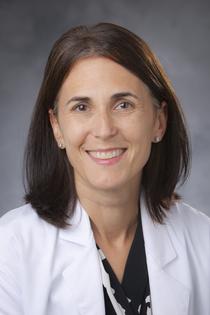
Submitted by Dr. Aimee Zaas
“Complications of Central Venous Catheterization” by Parenti, et al in the NEJM. N Engl J Med 2015; 373:1220-1229
Why did I read this? It caught my eye because this is what I did my SAR talk on (circa 2001 for those wondering if central lines were used back “in the day”), and we have such a great new simulation and ultrasound program this year (thanks Cara O’Brien and Nilesh Patel) that I was thinking about all the lines you guys put in. Did you know that the study that made full drapes, gowns and gloves for line placement hit prime time during my residency. Seriously, we used to use a small sterile drape only.
What did the authors do? They wanted to figure out what the complication rates were for CVCs and if they differed by site of insertion. They randomized patients who were admitted to any of the 10 participating ICUs and were to receive a central venous catheter to either 1:1:1 for IJ vs subclavian vs femoral, or if one of those sites wasn’t suitable, then they were ‘selectively randomized’ 1:1 to the sites available. IF only one site was suitable, they were excluded. All procedures used previously accepted central line checklists, full barrier precautions and providers who had placed AT LEAST 50 lines. Importantly, catheters were not used for routine blood sampling.
At time of removal, tips were cultured. If the patient left the ICU with the catheter, a catheter and peripheral blood culture were drawn. After catheter removal, routine US for DVT was performed.
Primary outcomes were catheter related complications (BSI or DVT) and secondary outcome was insertion related complications.
A total of 3027 patients were included in the study. A total of 3471 catheters (1284 jugular, 1171 femoral, and 1016 subclavian) were included, of which 2532 (72.9%) were randomly assigned in the three-choice scheme (845 jugular, 844 femoral, and 843 subclavian). Median catheter duration was 5 days. While most patients had catheter tip culture and blood culture data, many did not get follow up ultrasound (59% of asymptomatic patients).
Results: Most CVCs did not have complications (CVC was the unit of analysis, not patients). Subclavian catheters had the least infections/DVTs (primary outcome), followed by IJ and then femoral. Total infection/DVTs were 8 events in the subclavian group, 20 events in the jugular group, and 22 events in the femoral group (1.5, 3.6, and 4.6 per 1000 catheter-days, respectively; P=0.02). However, complications were highest in SCL, then IJ then femoral. Total insertion complications were 8 events in the subclavian group, 12 events in the jugular group, and 6 events in the femoral group.
Conclusions and comments: This study confirmed prior findings regarding catheter related complications. The authors note that since ultrasound use was not standardized, perhaps some complications of insertion could have been reduced even further. They do not comment on the rather non-routine practice in the study of determining catheter related infection (culturing catheter tip even when infection not suspected). That said, the rate of infection based on this non-standard practice was very low. It is hard to comment on the DVT findings given the large % of patients who did not get testing.
So, what can be said about this article? I don’t think that it provides earth-shattering data. However it does help us recognize that even VERY experienced operators can have complications and that being comfortable with several options for central lines is a good thing if you are going to be placing lines as part of your ongoing practice. The jury is out on “how many’ procedures it takes to determine competence, but this study shows us a decent baseline for complications in a large set of patients with lines placed by experienced operators.
QI CORNER
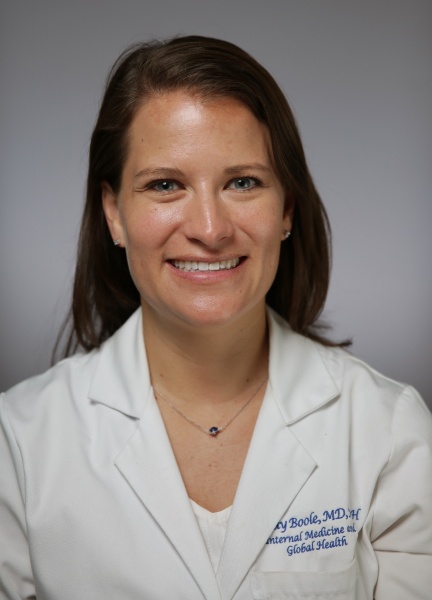
The Making Wise Choices Easier high value cost-conscious care competition is heating up. There are several talented teams putting proposals together. Don't forget the Oct. 19th deadline! I am happy to look at proposal drafts in the next couple of weeks, and Lish and I are both just so excited to see the excitement for high value care. The flier, which contains proposal formatting details, is posted on the Med Res doors and is attached at the bottom of Weekly Updates. Remember, top 3 teams win a cash prize.
You guys have also really picked up the pace on flu vaccines. We are moving right along, with 62% of you already vaccinated. If that doesn't yet include you, get your flu shot TODAY. We need 100% compliance and we can't stop/won't stop (bugging you) until we get there!
Finally, mark your calendars for the next PSQC meeting NEXT week on Thursday Oct. 8th at 5:30pm. You will have an opportunity to break out and do some planning with your Making Wise Choices teams. We'll also be making some decisions on the details and format of our whole-group paging-improvement project. Join us!
CLINIC CORNER
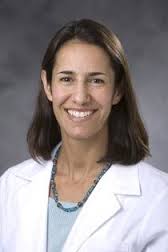
Hi everyone! Lots of cool things to talk about in the ambulatory world this month:
- Introducing the Ambulatory Care Leadership Track (ACLT): Calling all interns who may be interested in either general internal medicine or a subspecialty where your focus will be ambulatory medicine, please consider applying to the ACLT. It’s a foundation for careers in general medicine leadership, primary care, academic ambulatory subspecialties, research, or education. Applications will be due closer to January, but please let us know whenever you become interested! Here are the program highlights:
- Three blocks of ambulatory medicine throughout JAR and SAR years, with dedicated didactic time following four key themes:
- Clinical: Expanded clinical options in fields inside and outside of medicine: sports medicine, ENT, ophtho, dermatology, obesity medicine, as well as all medicine subspecialties
- Teaching: Curricula in teaching and opportunities to teach in small group as a SAR
- Scholarship: Support for preparing and presenting scholarship, ambulatory journal club
- Advocacy and health policy: seminars given by faculty in government relations and health policy throughout the year, and an advocacy trip in the spring to both Washington DC and Raleigh, NC, alternating year.
The ACLT track has evolved since its inception in 2012, all in response to learner feedback. This is a learner driven experience and a wonderful opportunity to realize your personal impact on the worlds of clinical medicine, education, leadership, and health policy. Email Dani Zipkin, Armando Bedoya, or Alex Cho if interested!
- Please fill out your Continuity Clinic Experience Evaluation (Learners’ Perception Survey) in MedHub! We take your opinions about your ambulatory experience very seriously, and rely on your feedback to continue to improve the clinics. Take a few minutes now and get it done! Thanks so much!
- DOC people: You are not alone!! Please check in with an attending (email, page, text) whenever you’re wondering about how to handle an after-hours clinical question of any kind. There are no silly questions – you’re learning, and we are your teachers! I’m happy to personally field any questions as well – my cell phone has been shared in emails recently (not reposting since this is public online). Please use it! – Dani
- General Medicine Health Services Research: It’s a thing! There are very satisfying careers in gen med research, and we have outstanding role models in this world at Duke. Health services research is multi-disciplinary and focuses on the impact of systems of care, access, cost, quality, behavior and other factors on health care outcomes. Here is an introduction to our fellowship, courtesy of David Edelman:
The Division of General Internal Medicine collaborates with the Center for Health Services Research in Primary Care in the Durham VA Medical Center to offer fellowships for MD and PhD scholars with an interest in training in clinical or health services research. The fellowship is ordinarily a two year program, though three year fellowships may be available to certain candidates. Training grants are funded by the VA Office of Academic Affairs (OAA). We have trained more than 100 fellows in our 30-year history, including many leaders in Health Services Research and many of our core faculty in General Internal medicine
The primary goal of the post-doctoral fellowships is for fellows to perform high-quality, mentored clinical or health services research working closely with a mentor from the Division of General Internal Medicine. MD fellows ordinarily obtain a Masters in Clinical Research from Duke’s CRTP program, with tuition paid by the fellowship. All fellows also participate in a Faculty/Fellow Development Seminar Series, a set of weekly, one-hour discussions addressing a variety of career development topics.
Click the link for more info:
http://www.durham.hsrd.research.va.gov/MD_fellowship.asp.
Or, contact David Edelman, MD, Fellowship Director (david.edelman@duke.edu).
From the Chief Residents
Grand Rounds
Friday, October 2 - General Medicine, Daniella Zipkin, MD
Noon Conference
| Date | Topic | Lecturer | Time | Vendor |
| 9/28/15 |
SAR Emergency Series: Capacity versus Competence |
Greg Brown |
12:00 | Dominos |
| 9/29/15 | SAR Emergency Series: Transfusion Medicine |
Li Wen Huang |
12:00 | Chick Fil A |
| 9/30/15 | SAR Emergency Series: CVA |
Kevin Friede |
12:00 | Nosh |
| 10/1/15 | K-Grant and Career Development (ITE) |
Aimee Zaas |
12:00 | Subway |
| 10/2/15 | Chair's Conference | Chiefs | 12:00 | Picnic Basket |
From the Residency Office
DOCTOBERFEST IS HERE!
“Taking Care of Our Community and Each Other”
October 1-31, 2015
Join the Internal Medicine Residency Program in our 4th annual Doctoberfest celebration! This year our continued focus will be on building and strengthening our community – with an added focus on taking care of each other and ourselves.
Have you witnessed an extraordinary act of kindness and compassion in one of your co-workers? If so, please take a moment to nominate them using the link below. Each day during the week of October 5 – 9, we will be awarding one of the nominees a Starbucks gift card and sharing their act of kindness with the program. Take a moment to recognize one of your amazing co-workers!
https://duke.qualtrics.com/SE/?SID=SV_5tETat6uOFhKY61
Please check out the PDF at the end of this post for a complete schedule of activities.
Get Your Flu Shot!!
Flu Vaccination Blitz This Week
We kicked off our annual flu vaccination campaign with a 24-hour Duke Medicine Mass Flu Vaccination drill on Thursday, September 17, 2015. Mass vaccination clinics will be available at each of the hospitals and clinics throughout DUHS. Following the drill, we will continue our annual flu vaccination program, during which time we will provide many additional opportunities for you to get vaccinated. A schedule of vaccination clinics will be posted on the employee intranet in early September. This list will be updated throughout the vaccination season. Vaccination is also available at Employee Occupational Health and Wellness (EOHW) during business hours.
Applications for Medical or Religious Exemption should be submitted before Monday, October 12, 2015. This will allow sufficient time for review and for communication of the review decision. Please note: Due to the availability of an egg-free formulation of the flu vaccine, egg allergy is no longer a valid reason for a medical exemption.
If you have questions about the flu vaccine or its availability, please visit the DUHS Influenza Resource Guide or duke.edu/flu, ask your manager or contact EOHW.
Together, we can stop the flu. Thank you for your commitment to keeping our patients, and our community, safe and healthy.
Key points for trainees:
Get this done ASAP.
If you have medical exemption, be sure it shows up on your personal OESO Page—contact EOHW for any questions.
If the flu vaccine is received at any site (including the VA) besides DUH, DRH, or DUKE RALEIGH, you should take a picture of your documentation form (legible name, date, location and lot #) and email it to eohwflu@dm.duke.edu.
Please direct any questions to kathryn.andolsek@duke.edu
BLS Blitz - November 2015
Just a reminder that the bi-annual BLS Blitz is coming up in November. The flier posted at the end of this blog has the dates. REMEMBER - Duke only holds BLS classes during the November and March blitz each yer, so if your BLS is expiring before March, PLEASE sign up for one of the dates in November!!
Global Health-Internal Medicine Residency Program Recruiting Eligible Candidates
Internal Medicine Residents who have successfully completed PGY1 are eligible to apply for the Duke Global Health Residency, an extended residency that leads to a Master of Science in Global Health and a total of nine months providing clinical care and conducting mentored research at a Duke University international partner site.
Please visit our website for an in-depth description of the core curriculum including rotations, global health competencies, and program requirements as well as application instructions:www.dukeglobalhealth.org
Watch current global health resident John Stanifer, MD, discuss his decision to pursue global health training at Duke:
Send all application materials electronically to sarah.brittingham@duke.edu.
Applications accepted on a rolling basis until October 1, 2015. Offers will be made in November.
Now Accepting Applications for Global Health Elective Rotations
The Hubert-Yeargan Center for Global Health (HYC) is now accepting applications for Global Health Elective Rotations for July 2016 and March 2017.
Application is open to Duke Cardiology Fellows (PGY 5 & 6) and Duke residents from the Departments of Medicine and Pediatrics: Internal Medicine (PGY 2); Med-Peds (PGY 3); Med-Psych (PGY 4); Neurology (PGY 2), Pediatrics (PGY 2).
The application is attached and available at http://dukeglobalhealth.org/education-and-training/global-health-elective-rotation.
(For detailed site information, send request to tara.pemble@duke.edu).
Interviews will be held in October. For more information about this opportunity, contact Tara Pemble, Program Coordinator at tara.pemble@duke.edu or 668-8352.
Application Deadline: October 5, 2015
2015 Carolinas COPD Symposium
When: November 20th, 2015
Location: Cone Center, UNC Charlotte; Charlotte, NC
Registration Link: https://continuingeducation.dcri.duke.edu/2015-carolinas-chronic-obstructive-pulmonary-disease-copd-symposium
Cost: $50 for Healthcare Providers; $25 for Public Health Practitioners
Event Contacts: For registration questions, please contact dcri.cme@dm.duke.edu or 919‐401‐1200. For program questions,
please contact Roy Pleasants at roy.pleasants@duke.edu
Duke University Severe Asthma Mechanisms, Diagnosis and Treatments
When: October 3rd, 2015
Location: Searle Conference Center (Duke University, Durham, NC)
Registration Link: http://continuingeducation.dcri.duke.edu/severe-asthma-conference-%E2%80%93-mechanisms-diagnosis-and-treatments
Cost: $50
Event Contacts: For registration questions, please contact dcri.cme@dm.duke.edu or 919‐401‐1200. For program questions,
please contact Roy Pleasants at roy.pleasants@duke.edu .
Upcoming Dates and Events
October 30 - Recruitment Kick-off!
November 26 - Turkey Bowl
December 12 - DOM Holiday Party
Useful links
https://intranet.dm.duke.edu/influenza/SitePages/Home.aspx
http://duke.exitcareoncall.com/
Main Internal Medicine Residency website
Main Curriculum website
Department of Medicine
Confidential Comment Line Note: ALL submissions are strictly confidential unless you chose to complete the optional section requesting a response
Opportunities
http://www.ad001.info/blasts/CKS/CKS15_05431/CKS15_05431.html